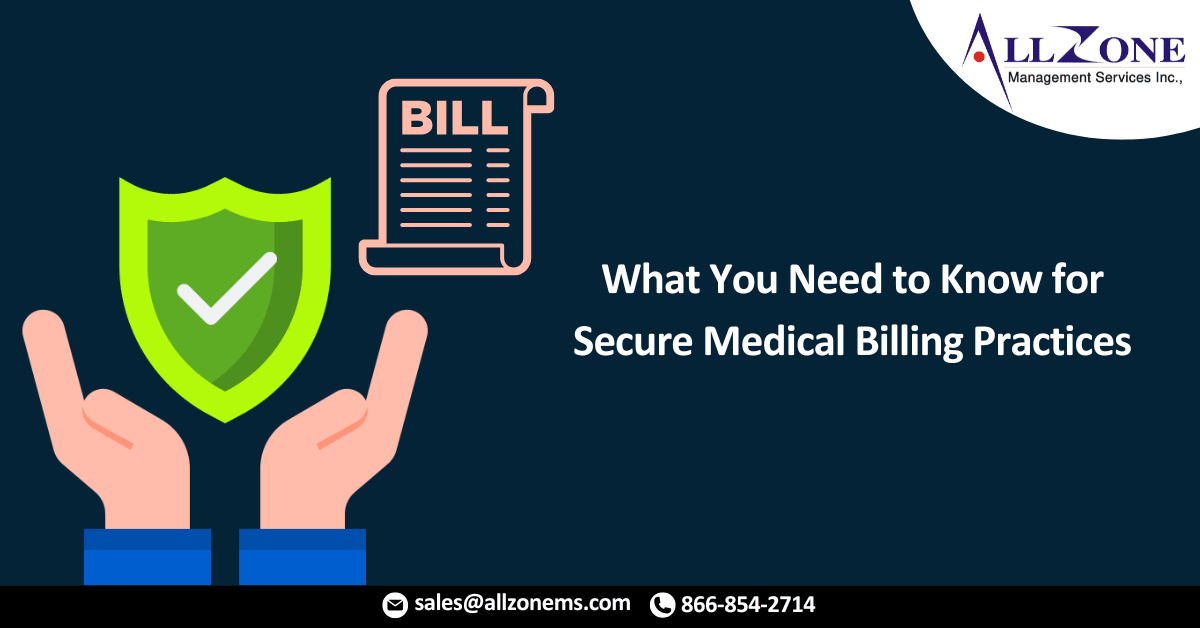Secure Medical Billing Practices: In the ever-evolving healthcare landscape, protecting patient privacy and safeguarding sensitive medical information remains paramount. The Health Insurance Portability and Accountability Act (HIPAA) serves as the cornerstone of these efforts, dictating robust data security standards for covered entities handling protected health information (PHI). As we navigate 2024, staying updated on HIPAA regulations and best practices is critical for medical billing operations of all sizes.
Key components of HIPAA:
To begin, let us review the key components of HIPAA
- Entities covered by the policy: The healthcare industry includes healthcare providers, health plans, healthcare clearinghouses, as well as their business associates (e.g., Medical billing companies).
- Protected Health Information (PHI): Including demographics, diagnoses, procedures, and billing details, this includes any information that is personally identifiable.
- Regulations regarding privacy: The rule outlines how covered entities are required to use and disclose PHI, ensuring that patients have access to and control over their information.
- Regulations on security: Under this rule, PHI must be safeguarded in a variety of ways, including administrative, physical, and technical measures.
- Regulation on Breach Notification: Data breaches affecting PHI must be reported in accordance with this rule, ensuring timely notification to affected individuals and the relevant authorities.
In HIPAA 2024, what is new?
Health and Human Services (HHS) continues to actively enforce HIPAA regulations and issue updated guidance in 2024, although no significant legislative changes are anticipated.
- Cyber security: Cyber attacks are becoming more frequent and sophisticated, requiring strong cyber security measures. Implementing multi-factor authentication, conducting regular risk assessments, and encrypting personal health information are essential measures.
- Technologies of the future: HIPAA compliance becomes increasingly important as mobile and telehealth solutions gain traction. Understand the privacy and security implications of these technologies, and ensure they are in compliance with HIPAA.
- Agreements with business associates: Contracts with vendors and business associates should be tightened, defining clearly their obligation to comply with HIPAA and their responsibilities regarding the security of patient data.
- Orientation and training: Maintain a culture of privacy and security within your organization by providing regular training to staff regarding HIPAA policies and procedures.
Secure Medical Billing Practices
Several best practices can enhance the security posture of your medical billing operation in addition to the essential compliance points
- Limiting PHI Collection and Sharing: Obtain patient consent for all non-routine disclosures of PHI and collect only the minimum amount of PHI required for billing purposes. Limit the disclosure of PHI to authorized personnel only.
- Establish access controls: Regularly review and audit access logs in order to identify any suspicious activities. Establish granular access controls to PHI according to the principle of least privilege.
- Technologies for data security: Ensure that data is encrypted before it is stored and transmitted, that emails are encrypted, and that firewalls are configured to prevent unauthorized access. Make sure that software is regularly updated and that vulnerabilities are promptly patched.
- Plan for incident response: Prepare a comprehensive incident response plan to address data breaches effectively, which should include procedures for identifying, mitigating, reporting, and recovering from such events.
- Patient Education: Provide patients with information regarding their privacy rights under HIPAA and give them clear instructions regarding how to access, amend, or request restrictions on their personal health information.
Despite the complexity of HIPAA regulations, adhering to them is not only a legal obligation, but also a moral responsibility. It is possible for medical billing operations to ensure patient information is secure, build trust, and prevent hefty fines and reputational damage by understanding and implementing robust security measures based on the evolving HIPAA landscape.
It is important to keep in mind that HIPAA compliance is an ongoing process rather than a one-time event. To ensure the security of sensitive medical information in 2024 and beyond, it is important that you stay informed, adapt your practices, and prioritize patient privacy.

